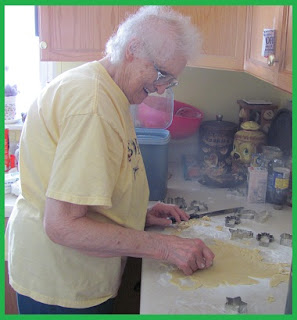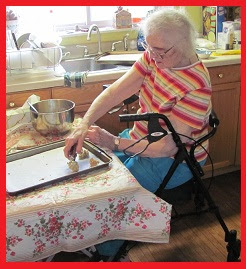 |
| Making sugar cookies Christmastime 2010 |
 I
try to do justice to those old recipes, but they never taste quite as
good as Mama's treats tasted back then, and I never manage to make the
vast array she always did. Today, my mother is approaching 88 years of
age, and she suffers from dementia, so she isn't able to help much with
the holiday baking, but I try to find ways to include her. I will
usually situate her at a small table sitting on the seat of her walker
chair, then I measure everything out and have her pour the ingredients
together and mix it, or she will do simple tasks like chopping nuts or
cutting, beating and frosting while I work on more complicated projects.
She never remembers anything for long, but for the moment, she's
feeling useful and helpful. Christmas gets more difficult every year
because Mom frets so much over it. She worries herself over and over
that she doesn't think she'll get to do any shopping, and I try to
assure her it's okay and we'll get to the store, but even when we do,
she forgets the moment she walks in the door that she's gone.
I
try to do justice to those old recipes, but they never taste quite as
good as Mama's treats tasted back then, and I never manage to make the
vast array she always did. Today, my mother is approaching 88 years of
age, and she suffers from dementia, so she isn't able to help much with
the holiday baking, but I try to find ways to include her. I will
usually situate her at a small table sitting on the seat of her walker
chair, then I measure everything out and have her pour the ingredients
together and mix it, or she will do simple tasks like chopping nuts or
cutting, beating and frosting while I work on more complicated projects.
She never remembers anything for long, but for the moment, she's
feeling useful and helpful. Christmas gets more difficult every year
because Mom frets so much over it. She worries herself over and over
that she doesn't think she'll get to do any shopping, and I try to
assure her it's okay and we'll get to the store, but even when we do,
she forgets the moment she walks in the door that she's gone.Mom had been showing signs of memory problems for many years. I remember my dad teasing her about "Old Timer's Disease" nearly 30 years ago, but it came on slowly. After Dad's death in 1992, my husband and I moved back into Mom's house to look after her, and I witnessed the progression. The first disconcerting change was when she'd begin to read newspaper articles aloud to me many times over... finishing the story, and within a few seconds, reading it to me again. This might go on a few times up to a dozen times. As soon as I found an opportunity, such as when she used the restroom, I would hide the paper just to avoid hearing it again, and she wouldn't even notice it was missing when she returned.
Mom's condition changed dramatically in October of 2008. Her oldest grandchild was getting married, and we drove across the state for the wedding. My husband and I took one motel room, and she had her own room across the hall. In the middle of the night, our room phone rang. The lady at the front desk was calling to tell us there was an elderly lady who had wandered down to the lobby in her nightgown and that she seemed very disoriented. The clerk had checked the records and deduced that she belonged with us. My husband went to the lobby to get her, and I moved some of my things to her room so I could stay with her the rest of the night. Neither of us slept very well that night, and I could tell something was bothering her. We attended the wedding, and then went to the reception for a while to have her photo taken with the family, but I'd conferred with my siblings about what had transpired the previous night, and told them we planned to take her home earlier than we had anticipated. The period following that weekend was very difficult for me.
I don't know if it was having me stay with her and make her feel safe at the motel, but suddenly she started to believe I was her mother, who had died 20 years earlier. Yet, at times, she also recognized me as Joyce. She had concocted a scenario that her mother and I both lived in the house, that her mother had started smoking, and that we both worked at the same convenience store, so that the flip-flopping of our presence would make sense to her. When her mother was here, I was at work, and when I was here, her mother was at work, and occasionally, we'd both be at work at the same time, leaving her at home with my husband. Often it was frustrating because I didn't know who I was supposed to be from one moment to the next. If I was fortunate, she'd give me a hint, such as telling me an item on the table was Joyce's, or that her mother "wears those same ugly shoes," meaning my Crocs. There were times I didn't know who I was in her mind, and I would say or do something that was obviously incorrect, and she would scold me for reading Joyce's mail, or a look of total confusion would cross her face, and I knew I wasn't me again. I developed quite an identity crisis.I knew we had to do something on Christmas that same year. We had finished opening gifts, and I was gathering up and folding wrapping paper to save for next year, as we have since I was a child. I looked at Mom sitting in her chair and she looked so sad. I asked her what was wrong, and my strong, private, mother, who never cried publicly, burst into tears and said she didn't get me anything. I had become her mother over the course of the morning, and she realized she hadn't bought a present for her. I put a chair next to her armchair, took her hand, and told her that it was okay and nothing to cry about. A little later in the day, after she had calmed down, I told her I wanted to talk to her. I sat down with her again and asked her who I was. She looked baffled and I said I'd tell her why I asked such a silly question after she answered. She told me I was Joyce, and I proceeded to explain to her that I wanted to be sure she knew who I was, because at times she thought I was her mother, and that was alright, because she just got mixed up sometimes. We talked and cried together for some time, and I told her we would try to help her remember better.
We made an appointment with her doctor and started her on a perscription of Aricept, which seemed to help a great deal. Her mother disappeared shortly after she started on the meds, and for a while, I was me again. As time passed, I once again became a split personality. This time, I don't know who I am, exactly, but when she talks to me about Joyce, I know I have become this nameless mysetery person of hers. Perhaps she thinks I'm my sister, perhaps a nurse, or just a friend who does things with her. I don't know, but more and more recently, that lady is here and Joyce is not. I imagine one day I will just fade away and won't exist at all. I'm not so sure she wants to be around her friend either, because she's always talking about going home, and sometimes packs a bag and gathers her purse & coat and sits in her chair waiting... anticipating a ride from someone to take her home.
We don't allow Mom to cook anymore, but she can still do some of the things that are ingrained in her mind after so many years of repitition... she can make coffee without too many mishaps, other than occasionally overfilling the coffee maker so it runs out the drain holes onto the counter. She washes and dries dishes and puts them away, although it's often a scavenger hunt for me when I cook, because things wind up in odd places. She can fold laundry and will even occasionally wash a load, although I'm never too sure if she's used detergent or the proper amount when she does that without my knowledge. I also try to find simple chores for her so she feels like she's helping. I ask her to peel or cut fruits and vegetables for me when I need them for a recipe, or to stir something on the stove while I'm preparing something else nearby so I can watch her. I take her shopping and she pushes the cart for me, although her only real interest is finding the candy aisle. Mom loves her candy. She says she inherited that from her daddy. She told me she never took up smoking because she liked chocolate better. Even with the failing memory and body, her wonderful sense of humor remains constant. We laugh and joke together all the time, and those are the moments I will remember best when she is no longer with me. One blessing in her memory loss is that she's forgotten that she quit singing years ago because she thought her gravely voice sounded bad, and sometimes she will sing for me again as she did when I was a child. She can remember most of the words to old songs, and I help her when she forgets. Often I will get her started on a song, and she joins in. One of her favorites to sing with me is the old Mac Davis tune, "Lord, It's Hard to be Humble." My mom is a hoot.
 |
| Mom and her older brother with Santa c.1927 |
No comments:
Post a Comment